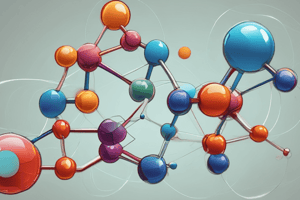Podcast
Questions and Answers
What is the difference between ionic and covalent compounds?
What is the difference between ionic and covalent compounds?
Ionic transfers electrons and covalent shares electrons.
When writing a covalent molecule, use ______.
When writing a covalent molecule, use ______.
prefixes
Do not criss-cross when using [blank].
Do not criss-cross when using [blank].
covalent bonds
To show the sharing of electrons in a covalent bond, you would [blank].
To show the sharing of electrons in a covalent bond, you would [blank].
To show the transfer of electrons in an ionic bond, you would [blank].
To show the transfer of electrons in an ionic bond, you would [blank].
What is the chemical formula for Carbon Dioxide?
What is the chemical formula for Carbon Dioxide?
What is the chemical formula for Water?
What is the chemical formula for Water?
When you add a prefix and it begins with (O), which letter would you exclude?
When you add a prefix and it begins with (O), which letter would you exclude?
What does 'Deca' refer to?
What does 'Deca' refer to?
What does 'Mono' refer to?
What does 'Mono' refer to?
Flashcards are hidden until you start studying
Study Notes
Ionic vs. Covalent Bonds
- Ionic compounds involve the transfer of electrons from one atom to another, while covalent compounds involve the sharing of electrons between atoms.
- In covalent bonding, prefixes are used to indicate the number of each type of atom in the molecule.
Writing Covalent Compounds
- When writing the formula for a covalent molecule, incorporate appropriate prefixes to denote the quantity of each element involved.
- Avoid the criss-cross method for determining ratios in covalent compounds, which is typically used for ionic compounds.
Representation of Bonds
- To illustrate electron sharing in a covalent bond, visually represent the shared electrons by circling them around the respective atoms involved.
- For ionic bonds, depict electron transfer by drawing an arrow from the electron on the metal atom to the anion that requires the electron.
Common Molecular Compounds
- Carbon Dioxide is represented chemically as CO₂, meaning one carbon atom and two oxygen atoms.
- Water is chemically represented as H₂O, indicating two hydrogen atoms and one oxygen atom.
Prefix Usage in Covalent Compounds
- When adding a prefix to a compound where one of the elements begins with the letter "O", omit the "A" and "O" from the prefix for smoother pronunciation.
- The prefix "Deca" signifies the number ten in a molecular formula.
- The prefix "Mono" indicates one atom of a particular element in a compound.
Studying That Suits You
Use AI to generate personalized quizzes and flashcards to suit your learning preferences.




